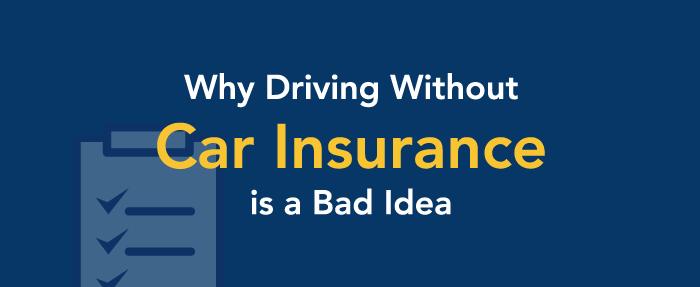
There are a number of reasons why you shouldn’t drive without car insurance. From penalties and fines to a suspended drivers license, driving without car insurance comes with some serious repercussions. Traffic laws are doled out at the state level, so make sure to stay current on your local laws and requirements, so you can best avoid motor vehicle infractions.
Insurance Requirements In Illinois
All vehicles operated in Illinois must be covered by liability insurance, which covers injuries or damages you may cause with your vehicle to other persons or their property. Vehicle owners are required to provide insurance information at the time of registration renewal. Once the vehicle owner signs the registration or renewal application, he/she affirms the vehicle is properly insured.
Minimum liability insurance limits in Illinois:
- $25,000 for injury or death of one person
- $50,000 for injury or death of more than one person
- $20,000 for damage to property of another person
Penalties for Driving Without Car Insurance
While penalties for driving without car insurance vary state to state you can generally expect the following to occur:
- Driver’s license suspension. You can have your driver’s license suspended for a many reasons, which include: accumulating an abundance of driving record points, receiving multiple traffic violations for speeding tickets, getting a DUI/DWI/OWI, failing to appear in court, not paying court fees and skipping out on child support payments.If you have a suspended driver’s license you may be required to enroll in a defensive driving course, provide a SR-22 certificate to show proof of insurance and pay reinstatement fees.
- Vehicle registration suspension. When your vehicle registration is suspended, neither yourself or anyone else (family included) can drive your car. Essentially, the state has taken away your right to to have your vehicle on the road. Your vehicle is no longer road worthy.
- Traffic ticket for a having no insurance. There is a small possibility that you can have the ticket dismissed by showing proof of insurance shortly after the date of your citation. More often than not, this only applies if you really did have insurance, but didn’t have your insurance card on you when you were stopped and ticketed for driving without car insurance. Keep in mind that many insurance companies now send insurance cards electronically and it is an accepted form of proof of insurance in most states.
- Proof that you have met SR-22 requirements. According to the Illinois Secretary of State Office, “An SR-22 guarantees that you’ll meet the minimum car insurance requirements for a specific period of time” and differs from an insurance card. This certificate would be issued to you by your insurance company upon request.
- Large fines. In addition to the many other hoops you have to jump through, you’ll have to pay to have your license and registration reinstated and pay the original traffic ticket fines. The amount of your traffic ticket depends on the type of violation. Were you speeding and how fast were you going? Were you in a construction or school zone? Do you have a poor driving record? Were you driving recklessly, under the influence of mind altering drugs or did you hurt someone? Still want to take the chance of driving without car insurance?
- Increase in your insurance rate. That’s right, you can bet your insurance provider will be hiking up that insurance rate in response to the traffic violation. Increased insurance premiums is pretty much inevitable. How much it increases and for how long depends heavily on your insurance company and where you live. The greater the violation, the higher the penalty or premium hike.
How Do I Appropriately Respond to Receiving a Traffic Ticket
The process you’ll need to follow to deal with your traffic ticket will be determined by the traffic court in the jurisdiction where you were cited. Fines and driver’s license points will vary depending on the severity of the traffic law you violated and the state you reside.
Pay your traffic ticket by the printed deadline, so you do not incur additional charges or late fees. This can be done securely and quickly online; however, traffic tickets can also be paid in-person, by phone or by mail. Do not let the ticket go hoping that it will disappear, this is true even if you can’t afford to pay the ticket. Most courts allow for those unable to pay the fine to commit to community service, work release or jail-time served. Contact the municipality you were ticketed in and formally request an alternative payment option. This needs to be done prior to the payment deadline. If you feel you were unfairly ticketed, consider speaking to an attorney who specializes in vehicular violations.
What If I Receive a Ticket Outside of My Home State?
If you are issued a ticket for driving without car insurance while driving in another state, you could still face an increase in your car insurance premium. Unfortunately for you, most states participate in a program that shares information between states regarding traffic tickets. Any ticket you receive in another state will most likely appear on your driving record. Once the traffic violation hits your record, your state’s Department of Motor Vehcles will determine next steps (if any). At that point your insurance provider will be alerted and decide if, when and how much they increase your premium.
Keep It Legal. DON’T Drive Without Car Insurance.
It’s fairly simple really, don’t drive without car insurance. In the very least you should have liability insurance which protects others’ assets on the road and keeps you from getting a ticket. Liability insurance is the most affordable option for those tight on funds, but do be aware of the limitations of this type of coverage.
If you’re interested in sharpening your knowledge and becoming a more proactive driver, contact Top Driver today to sign up for an online driving course.
